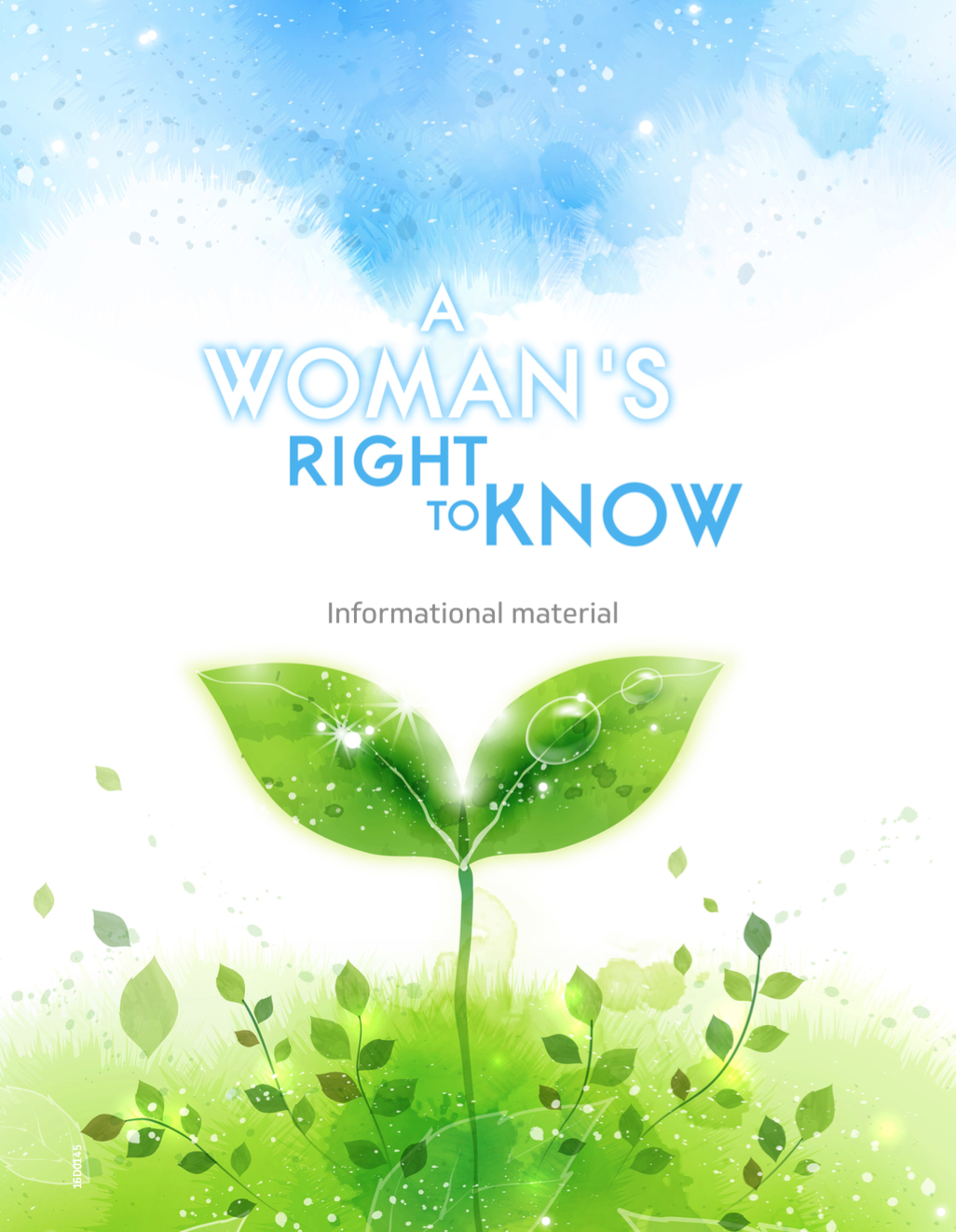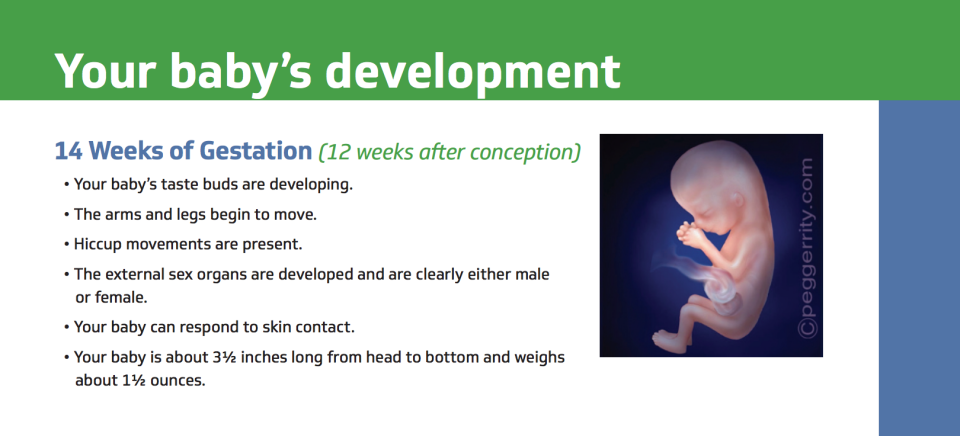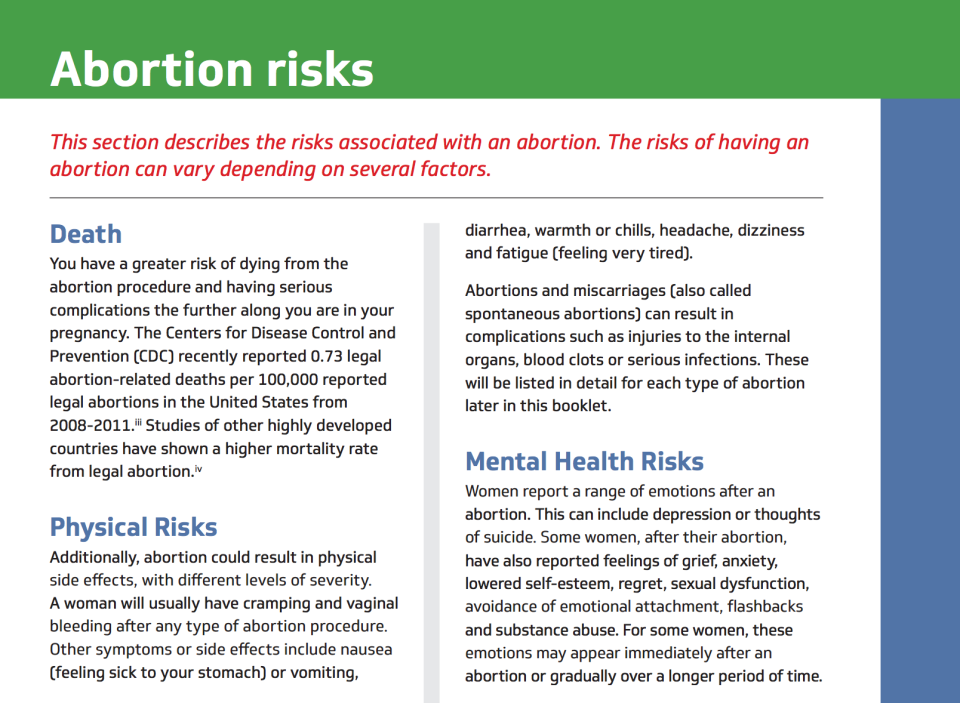Texas Medical Booklet Links Cancer to Abortion


A 24-page booklet that women in Texas must receive when considering an abortion was updated this week by the state Department of State Health Services, and though the book promises women "a right to know the truth," the information given is lacking in clarity and contains noticeably biased phrases like "your baby" and "the baby that is growing in your womb."
Mimicking a popular slogan from the pro-choice movement, the booklet is titled A Woman's Right to Know. Clinicians are required by a 2003 Texas statute to give the booklet to women considering an abortion 24 hours before a scheduled procedure, and this recent update marks the first time the literature has been changed since the original booklet was released in 2003.
According to the 2003 statute - called "the Woman's Right to Know Act" - there is no periodic requirement for the DSHS to update the literature in the abortion booklet. The only rule on updating the booklet information says that the department "shall annually review the materials to determine if changes to the contents of the materials are necessary." For 13 years, it seems the department found no need to update the materials, even though new research was made available in that time. It wasn't until June 28, 2016, or the day after the Supreme Court ruled to overturn parts of Texas's omnibus abortion bill, House 2, that the department proposed updates for the very first time since 2003.
The new booklet uses the phrase "your baby" 79 times.
The Supreme Court's opinion in Whole Woman's Health v. Hellerstedt was celebrated as a major win for evidence over ideology - if a state is going to pass restrictive abortion laws, it must provide legitimate evidence that those laws truly do improve women's health. While the booklets Texas forces upon women seeking abortions aren't new, the timing of the proposed updates - which were heavily criticized by physicians and researchers - seemed incredibly bold, considering the Supreme Court's opinion.
One major change between the 2003 and 2016 versions of A Woman's Right to Know is the language used throughout. The new booklet uses the phrase "your baby" 79 times - that phrase only appeared four times in the 2003 version, though the old version did include 29 instances of the phrase "unborn child." Daniel Grossman, a professor at the University of California San Francisco and an investigator at the Texas Policy Evaluation Project whose research was referenced by the Supreme Court in the Whole Woman's decision, told Cosmopolitan.com that the medically appropriate term for the phrase "your baby" would actually be "embryo," or, after the second trimester, "fetus." But the words "embryo" and "fetus" only appear nine total times, combined, in the new version of A Woman's Right to Know.
"I can only hypothesize that it sounds like very biased language that is meant to make women feel bad about their decision," Grossman said. "It's certainly not medically appropriate."

In June, when these now-official changes were merely proposed draft updates (which you can see linked here, courtesy of the Texas Tribune), Grossman and the Texas Policy Evaluation Project wrote a letter to the DSHS, drawing attention to "medically inaccurate information" contained in the draft. While at least one point from their letter regarding medically inaccurate information on the death risk associated with abortion seems to have been corrected in the adopted changes, the new booklet still contains some information that's misleading, at best.
Still, death is mentioned several times throughout the booklet. In a section addressing abortion risks, the first risk listed, in bold print, is death - even though the most recent data shows death associated with abortion is incredibly rare (0.7 deaths per 100,000 procedures, overall). Death is again listed as the first bullet point in a section on risks associated with second-trimester abortion.

Something Grossman said is the most shocking to him is the way the booklet minimizes the risk of death associated with carrying a pregnancy to full-term. Though he clarified that the risk of death is thankfully low with both childbirth and abortion, A Woman's Right to Know uses old, outdated maternal mortality statistics in a section on risks associated with childbirth. In recent years, the maternal mortality rate has nearly doubled in Texas, for reasons that aren't yet entirely clear (but could have something to do with the drastic family-planning budget cuts made by former state Gov. Rick Perry in 2011). A Woman's Right to Know, however, does not use those new, increased maternal mortality statistics in its literature - instead citing old, nationwide (not Texas-specific) statistics that reflect a lower rate than the one that currently exists.
"If they’re going to focus on [death], they should make a clear comparison between the risk for abortion and for continuing the pregnancy to term," Grossman said. "It’s quite clear that risk is many-fold higher for women deciding to continue the pregnancy to term than it is for an abortion."
Even in places where the booklet cites medically accurate information, the way that information is presented is often misleading - especially considering the fact that it's being given, by a medical professional, to women in the midst of making a major decision, and are then told they have to think about that decision for 24 more hours before any procedure can actually be done. Two instances that stand out as glaringly misleading are the stated risks associated with breast cancer and mental health.
The booklet includes a bolded subsection titled "Breast Cancer Risk" in the section on abortion risks and in the paragraph that follows, explains there is, in fact, no associated increase of breast cancer with abortion. Another bolded subsection titled "Mental Health Risks," included in the same section on abortion risks, fails to cite a single study linking an increased risk of depression or thoughts of suicide to abortion, though the booklet mentions both of those things as potential consequences of abortion. Grossman pointed out that there is a study on the mental health outcomes associated with abortion and childbirth available (the Turnaway Study), and the Texas Policy Evaluation Project called attention to that study in its letter to the DSHS, but the booklet still fails to cite that very readily available information. If the department had chosen to cite the Turnaway Study, it would have had to write in the booklet that women who receive abortions actually tend to have better immediate mental health outcomes than women forced to complete a pregnancy that's unwanted. Mental health returns to baseline for most women in about a year.
During Texas's 2015 legislative session, three state Democrats co-authored two bills to address medical inaccuracies in A Woman's Right to Know. The Texas Tribune reported that both of those bills were left pending in committee and were never passed.
Follow Hannah on Twitter.
You Might Also Like

